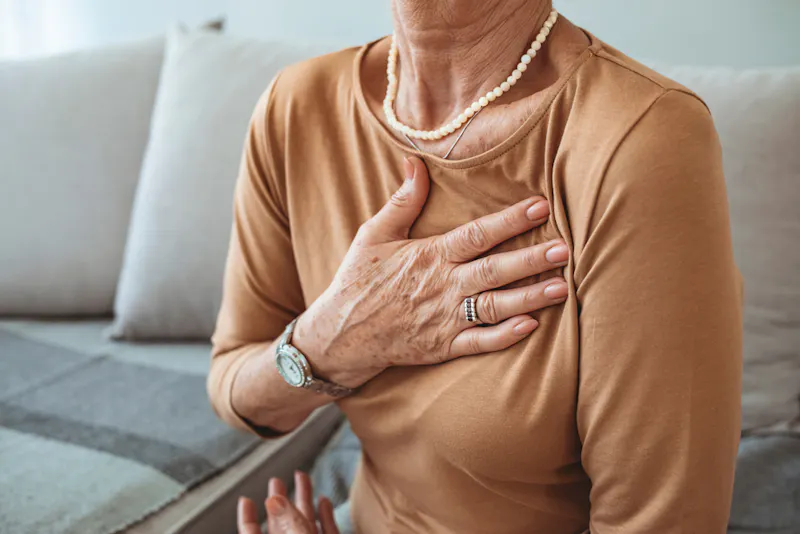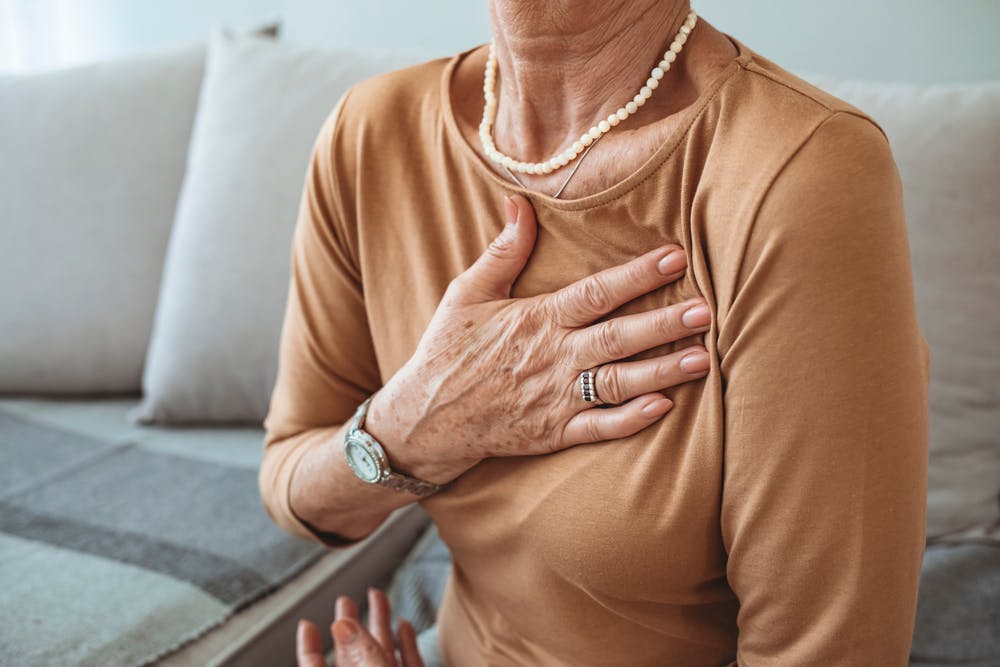Heart attacks
What's covered?



A heart attack is when blood isn’t able to reach your heart because of a blockage. Symptoms include dizziness, chest pain, and shortness of breath. If you think you might be having a heart attack, you need to go to hospital to be treated as quickly as possible.
What’s a heart attack?
A heart attack happens when blood can’t reach your heart.
It’s usually caused by coronary heart disease (CHD) — when the tubes which carry blood to your heart (coronary arteries and their branches) get blocked by fatty substances (plaques) and blood clots.
Blood carries oxygen, so these blockages might stop oxygen reaching your heart. Your heart needs oxygen to survive, so this will sometimes seriously damage it. This damage is called infarction. ‘Myocardial infarction’ is the medical term for heart attacks — it means damaged heart muscle.
Heart attack symptoms
Heart attack symptoms vary from person to person, but often include:
- chest pain — like a squeezing sensation or pressure on your chest
- chest pain that travels to your left or right arm, neck, jaw, back, or stomach
- feeling sick, sweaty, light-headed, or short of breath
Men and women often experience chest pain when having a heart attack. But women are less likely to than men. They are also more likely than men to feel sick, have back or jaw pain, and feel short of breath. So it’s important to look out for these signs as well as chest pain.
Less often, women and men's symptoms include:
- coughing a lot
- sudden overwhelming anxiety — like something really bad’s about to happen
Severe chest pain is a common heart attack symptom. But we all experience pain differently, so some people who have heart attacks might experience milder pain that feels like indigestion. Some people don’t feel pain at all — this is more common if you have diabetes, or if you’re older.
The pain might feel similar to angina (chest pain which is caused by a lack of blood flow to the heart muscles), but it’s more severe and lasts for longer.
What should you do if you think you’re having a heart attack?
Most chest pain isn’t serious, but you should get medical advice to make sure.
If you have sudden chest pain that:
- spreads to your arms, neck, back, and jaw
- makes your chest feel tight or heavy
- started with shortness of breath, feeling sweaty, feeling or being sick
- lasts for more than 15 minutes
Or if you think you’re having a heart attack, it’s best to call 999 so you can get help quickly.
See your GP or call 111 if you have chest pain that comes and goes, or you have chest pain that goes away quickly but you’re still worried.
While you wait for help, it’s important to:
- rest — to put less strain on your heart
- do your best to stay calm
- take 300mg aspirin — if you’re not allergic and it’s within reach. (Chew the tablet so it works faster)

Can you prevent heart attacks?
Heart attacks are usually caused by CHD. CHD can be prevented or slowed down by:
- keeping active
- eating a diet full of fruit, vegetables, oily fish, nuts and seeds, and whole grains — like a Mediterranean diet
- not drinking more than 14 units of alcohol a week
- stopping smoking
- improving your blood cholesterol levels
- reducing your blood pressure
- improving your blood sugar control if you’re diabetic
Taking recreational drugs, like cocaine and amphetamines (speed) increases your chances of having a heart attack. That’s because they might make your arteries narrower. Avoid or stop using recreational drugs to reduce your heart attack risk.
If you’re over 40 in the UK, you can visit your GP to have your cardiovascular risk checked. This includes checking your blood pressure and cholesterol.
Do women have heart attacks?
It’s a common misconception that heart attacks are a ‘male disease’.
This isn’t true — in the UK, CHD is the second most-common cause of death among women (after dementia).
But women might be less likely to seek medical attention quickly, so it’s important to seek treatment as soon as you recognise the warning signs.
Bhupathiraju, S. N., & Tucker, K. L. (2011). Coronary heart disease prevention: nutrients, foods, and dietary patterns. Clinica chimica acta, 412(17-18), 1493-1514.
British Heart Foundation: No difference in key heart attack symptoms between men and women. Retrieved 8 February 2022 from: https://www.bhf.org.uk/what-we-do/news-from-the-bhf/news-archive/2019/august/no-difference-in-key-heart-attack-symptoms-between-men-and-women
Emslie, C., Hunt, K., & Watt, G. (2001). Invisible women? The importance of gender in lay beliefs about heart problems. Sociology of Health & Illness, 23(2), 203-233.
Flink, L. E., Sciacca, R. R., Bier, M. L., Rodriguez, J., & Giardina, E. G. V. (2013). Women at risk for cardiovascular disease lack knowledge of heart attack symptoms. Clinical cardiology, 36(3), 133-138.
Kozor, R., & Figtree, G. (2012). Occasional Cocaine Use Can Do Acute and Chronic Damage.
Lai, H., Stitzer, M., Treisman, G., Moore, R., Brinker, J., Gerstenblith, G., ... & Lai, S. (2015). Cocaine abstinence and reduced use associated with lowered marker of endothelial dysfunction in African Americans: a preliminary study. Journal of addiction medicine, 9(4), 331.
Mahtta, D., Ramsey, D., Krittanawong, C., Al Rifai, M., Khurram, N., Samad, Z., ... & Virani, S. S. (2021). Recreational substance use among patients with premature atherosclerotic cardiovascular disease. Heart, 107(8), 650-656.
Meischke, H., Kuniyuki, A., Yasui, Y., Bowen, D. J., Andersen, R., & Urban, N. (2002). Information women receive about heart attacks and how it affects their knowledge, beliefs, and intentions to act in a cardiac emergency. Health Care for Women International, 23(2), 149-162.\\
Ohga, E., & Matsuse, T. (2000). The relationship between adhesion molecules and hypoxia. Nihon rinsho. Japanese Journal of Clinical Medicine, 58(8), 1587-1591.
Paikin, J. S., & Eikelboom, J. W. (2012). Aspirin. Circulation, 125(10), e439-e442.
SIEDLACZEK, M. CARDIOVASCULAR EFFECTS OF COCAINE-Case report.
World Health Organisation (2020): WHO methods and data sources for country-level causes of death 2000-2019. Retrieved 26 February 2022 from: https://cdn.who.int/media/docs/default-source/gho-documents/global-health-estimates/ghe2019_cod_methods.pdf?sfvrsn=37bcfacc_5
Williams, C. D., Chan, A. T., Elman, M. R., Kristensen, A. H., Miser, W. F., Pignone, M. P., ... & McGregor, J. C. (2015). Aspirin use among adults in the US: results of a national survey. American journal of preventive medicine, 48(5), 501-508.